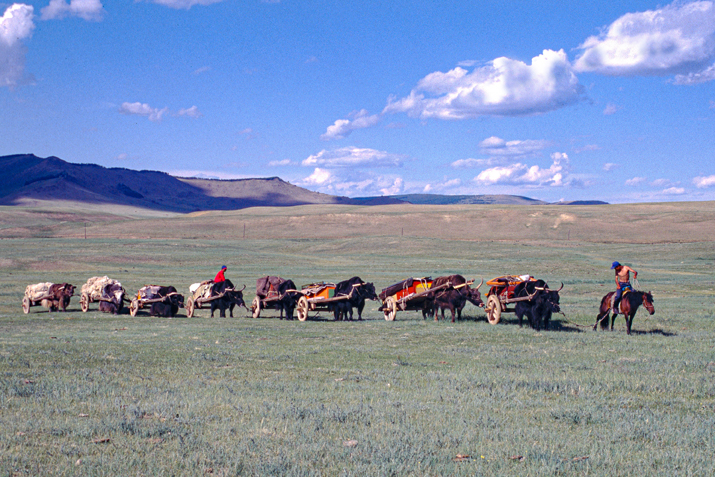
Hidden rip-off
N 49°01'802'' E 104°01'571''
Day: 19
Sunrise:
05:51 h
Sunset:
8:26 pm
Total kilometers:
400
Temperature – Day (maximum):
23 °C
Temperature – day (minimum):
17 °C
Temperature – Night:
15 °C
Latitude:
49°01’802”
Longitude:
104°01’571”
Maximum height:
1415 m above sea level
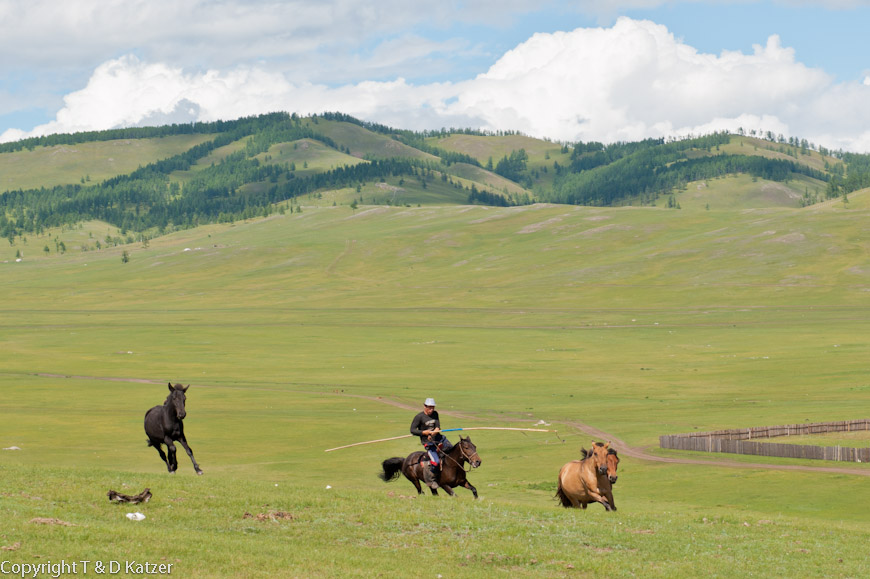
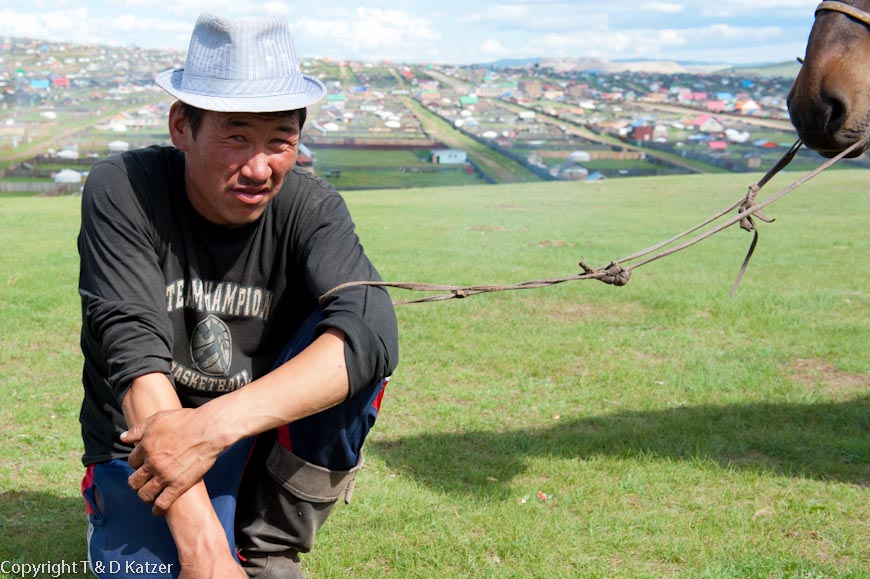
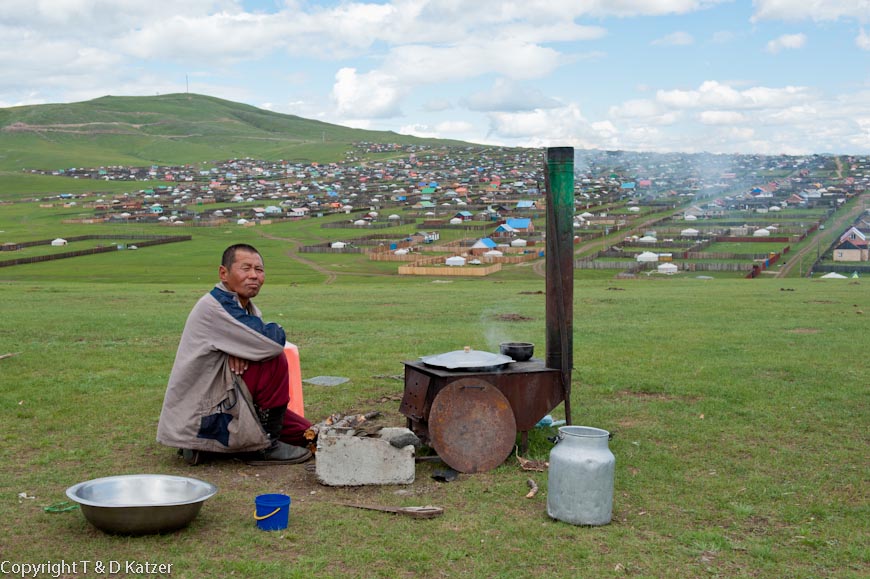

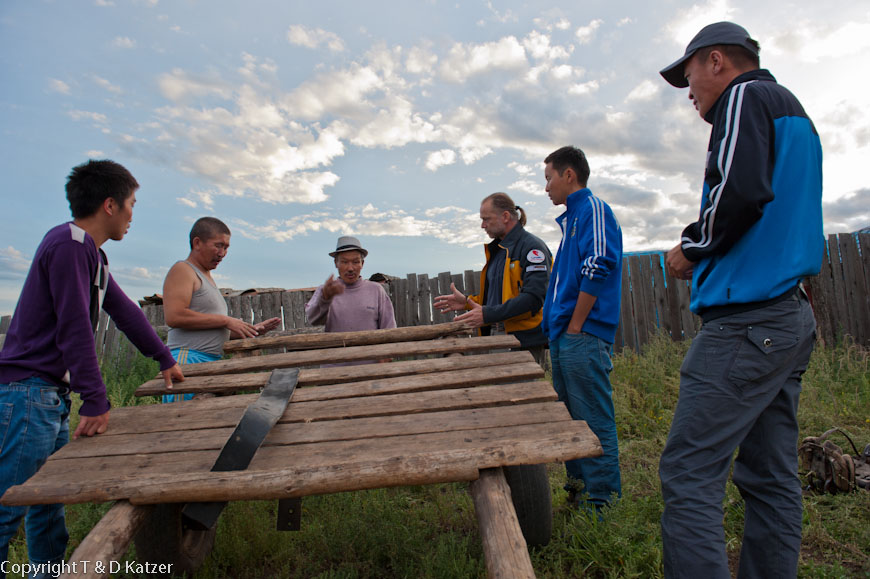
In the morning, Tanja prepares pancakes and last night’s pasta for everyone. Although Mongolians like to eat meat for breakfast, the pancakes go down surprisingly well, much to my regret. Naraa has placed all the food she has to offer on the table and every guest takes from the same plate or bowl with the same fork. So you can’t be too sensitive here. We have heard that many of the Mongolians have jaundice. No wonder. This way of sharing a bowl and often the same cutlery allows viruses to spread freely. We hope for our defense and try to use our own plates, bowls and cutlery as much as possible. However, we have no idea how this can be done on our trip in the yurt camps.
I ask Tsaagaan when he can start building the horse-drawn cart. “I don’t have any tools. If I had any, I could start right away,” his statement startles us, as the construction of the horse-drawn carriage was one of the most important conditions of his employment. Tanja and I look at each other in surprise. We deliberate for a while and come to the conclusion that there is no point in arguing here now. “I hope Tsaagaan is better than he’s showing us right now. Yesterday he hardly lifted a finger when we were buying horses and carts and today he says he has no tools. If he had said something about this during the recruitment interview, we would certainly have opted for Bilgee,” I say. “He definitely knew that,” Tanja suspects. “Okay, then we need to find a carpenter,” I decide. “My neighbor is a very good carpenter and his son even has a car that he’ll be happy to drive you around in,” suggests the lovely Naraa.
Since Ulzii’s brother’s minibus is supposedly broken, Naraa’s suggestion comes at just the right time. It doesn’t take long for the neighbor’s son to pull up in front of Naraa’s log cabin in his run-down small car. Before we set off to look for good riding horses with him, we go in search of an old shepherd who is said to live somewhere around here. He wants to sell us one of his horses. Ulzii got in touch with him in a way that is unexplained to us. We start the day charged with positive energy and confident of finding the right horses today. The car, ready for the scrap heap, creaks and groans from every nook and cranny and every hinge as we drive over the gravel and clay tracks through the alleyways to find the shepherd’s home. The four wheels laboriously work their way over the rough surface, which is more suitable for an off-road vehicle than for such a broken-down box. After half an hour we are successful and discover the old man’s house. “How is it supposed to fit in the car?” I ask. The question is quickly answered. “I’ll sit on your lap,” says Tanja and comes forward. However, the car is so small that Tanja sits with her entire weight on my stomach, which has been bothering me for days because of the change in diet. “That’s impossible,” I groan, whereupon Tanja squeezes into the small back seat with Taagii, the old man and Ulzii. Before we drive to the old nomad’s yurt camp in the hilly steppe, we first want to visit the animal market. However, it doesn’t take long and we all agree that we can’t buy any suitable animals for an expedition in this place. Yesterday also showed us that it is cheaper to get horses in the countryside. Before we set off in the junk car, whose fittings are constantly being polished by its 21-year-old owner, we drop Tanja off in a public internet shed. “When I’ve checked my emails, you can come and pick me up again,” she says. In the meantime, we visit the father of our driver. I follow Taagii and the driver through a maze of corridors in a building full of stores. We meet the man in one of the small shoe stores. He sells modern hiking and trekking shoes from Russia and China. “Is that his business?” I ask Taagii. “I think so,” he replies and tells me that some Mongolians have several jobs. I explain in detail how I envisage the horse-drawn carriage and at the end of the conversation I ask how much it will cost. “Oh, say what you think,” he says. Since we have been in Mongolia, we have heard this statement again and again. We now know why. This has nothing to do with generosity or modesty because the Mongolians know that we come from a rich country and therefore expect to be paid handsomely. Many tourists have no idea how much is earned in Mongolia and apparently give large tips that amount to several days’ wages. For us, this means that we have to be very careful not to be completely excluded. Whenever we pay one or two days’ wages for a few hours’ work, it’s not enough in the end and there is renegotiation or people are simply offended if we only pay the agreed price. Not an easy situation for Tanja and me. That is why we have gotten into the habit of fixing the right price right from the start. At least this way we think we can avoid difficulties later on. “I need to know what you charge for the day?” I ask. “Hm, a construction worker earns 20,000 tugrik (€11.50) a day. I want less, just 15,000 tugriks” (€8.60), he says with a modest smile. I know that the best-paid jobs in the country are in construction and mining. Mostly for skilled workers. Therefore, 20,000 Tugrik is more than three times the average income. His modest offer of 15,000 tugrik is more than twice the salary of a normal wage earner. Nevertheless, I don’t want to bargain around and say yes. “Do you have the tools to build a trolley like this?” I ask to be on the safe side. “Yes, I have, but I need two more people to help me with the construction and they get paid the same,” says the man casually, as if he were lighting a cigarette. “Three people with you? And how long does the job take you?” “Two days. You also have to pay for the fuel for the truck we need to buy the parts and of course all the materials, including the welding rod,” he says, startling me. “How much is it going to cost?” “Just the fuel and the driver’s salary. I can only tell you the price of the materials when we buy them,” he says. I swallow, twitch my calculator and estimate the costs. “That’s going to be a damn expensive horse-drawn carriage,” I say, not knowing how to react at first. Last night we had already visited two carpenters who were unfortunately so busy that they didn’t even ask what we were paying or not paying. And now we have someone who simply rips me off. “When can you start?” “Tomorrow, if you like.” “Good, then you’ll get the job,” I decide quickly so as not to waste any more time.
“A shepherd told me that he has good horses for you on the outskirts of town,” says Taagii on the way to the internet. As Tanja isn’t ready yet, we decide to go there quickly. We make a detour to the carters to give them the promised deposit of 300,000 tugrik (€172). To be on the safe side, I ask for the second harness which, according to yesterday’s conversation, was included in the price. Suddenly they no longer want to know anything about it. It takes me a lot of effort to restore the old state of negotiations. Then I shake hands with the two salespeople again and hope I can rely on them this time. “Just keep your nerve,” I whisper and start to wonder what possessed us to set up a horse expedition here in Mongolia.
Before we hobble out of town with the old crate, I buy orange juice for the whole team at the supermarket. The old man, who accompanies us the whole time without complaint, particularly enjoys the drink. Then we puff up a hill covered in short grass with the fully loaded Gefährd. We stop at a yurt. In fact, we are expected by a shepherd called Ulaanaa. Like the horse salesman yesterday, he also points to a galloping horse in a large herd. Again I say I have to see and ride the horse. The nomad then swings himself into the saddle. He is also equipped with the lance-like thing with a large noose at the end. From a standing start, the man gallops off so fast that shreds of earth fly around our ears. I marvel open-mouthed at the best riding skills I have ever seen. The nomad flies with his horse into the herd racing away wildly. With his lance at the ready, he chases after a light brown stallion. He leans into the bend as if his mount had spikes on its hooves. I’ve only ever seen this kind of lean angle from motocross riders. The light brown is full of power and adrenaline. He runs in zigzags and does not want to lose his freedom under any circumstances. His pursuer, however, is not impressed in the slightest. Standing upright in the saddle, steering his animal only with his feet, he rages after the fugitive until his noose is wrapped around his neck. Smiling, he comes to us with the wild one in tow. Ulaanaa jumps out of the saddle and says: “Please, now you can ride me if you want”. Since Tsaagaan joined us after the Internet, I let him go first. I want to see if he can ride or if it turns out to be something he could do when he was young but is now too old for it. The light brown, strong horse is given a saddle and Tsaagaan swings up. He rides a round and I try it too. Thank God the tomboy doesn’t throw me off. On the contrary, he is excellent to ride. Then the nomad catches another animal that looks the same. This time Taagii wants to give it a try. He also cuts an excellent figure. “How much are the two horses supposed to cost?” “500,000 Tugrik each”, says the nomad and a friend of his who has now come out of the yurt. That is a top price here. I act and say I won’t pay more than 450,000 (257,- €) with the risk of not getting the horses. Only when I stand firm and run back to the car do the two shepherds intervene. “Please bring the horses to our address in three days,” I say, to which they immediately agree. We also agreed the same date with the carters. That way we have all the horses together at the same time. It doesn’t make any sense in the past as the grass in Naraa’s front garden is sufficient for the horses for a maximum of two days. Although Taagii said that we only needed 20 minutes to look at the horses, three hours have now passed. So that Tanja wouldn’t worry, I kept her informed about the progress of things by cell phone. In the best of moods, having now bought two very good riding horses, we pick Tanja up and drive to our log cabin. But first we take the old shepherd, who has been with us all day and has been patiently waiting to sell one of his horses to us, home. Although he has not done any business, he is still in good spirits.
I want to pay our driver, the carpenter’s son, and because Ulzii’s uncle wasn’t satisfied with 10,000 Tugrik yesterday, I give him fuel costs plus 15,000 Tugrik. He shakes his head. “Is that too little?” I ask in astonishment, to which he says: “I get 30,000 Tugrik”. (17,50 €) We are speechless. “Like father like son,” I say to Tanja. After a lengthy and awkward negotiation, we agree on 20,000 Tugrik. “We’ll take a cab tomorrow. It’s definitely cheaper,” decides Tanja.
We look forward to your comments!

